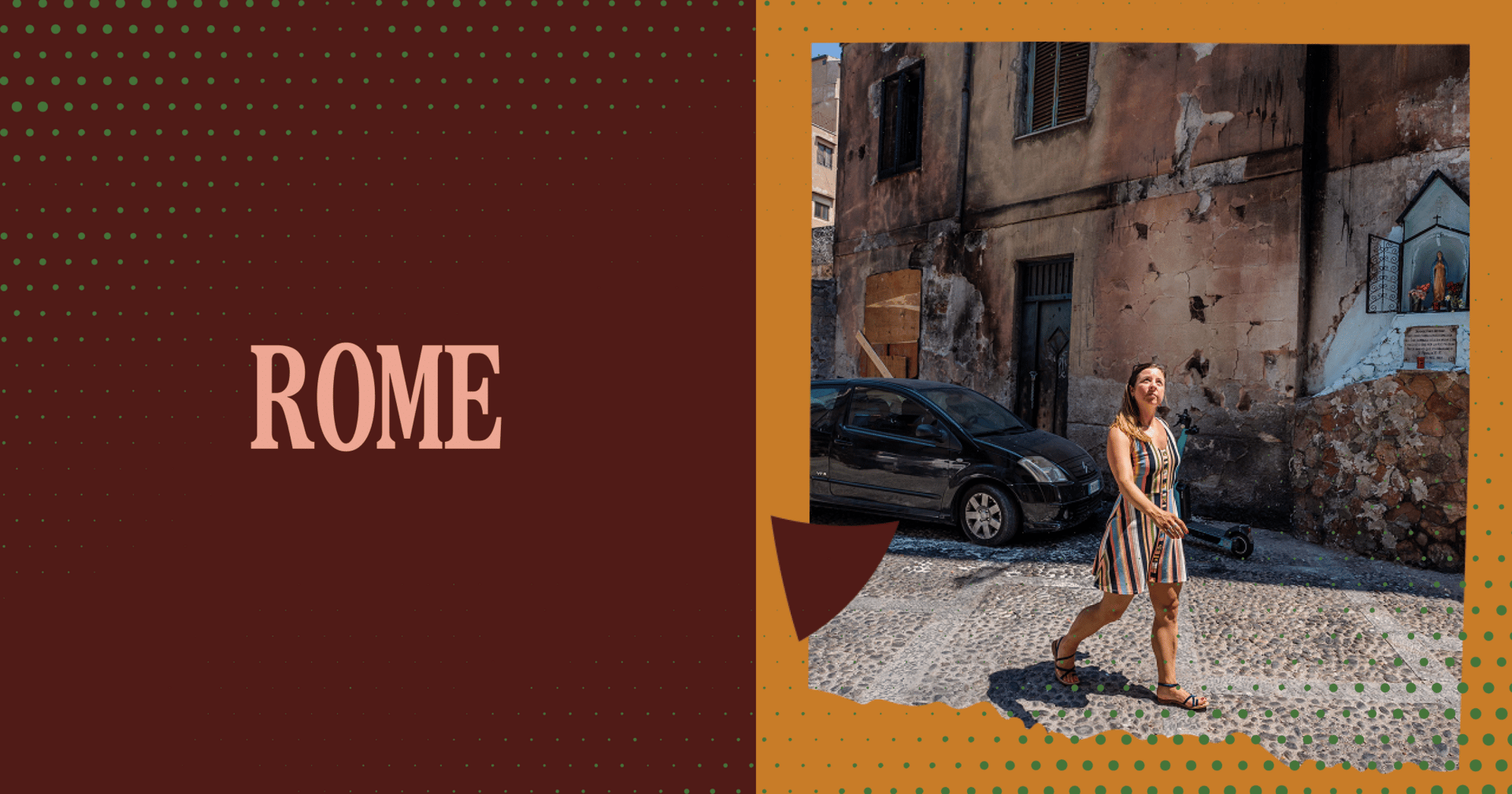Welcome to the Friday edition of Huge Fan called Why We Scream!
Fridays are for the heart. Stories from the fans. Why they stay, who they've met, and the love that keeps pulling them back. Tuesday’s posts focus on how fandom fuels business and the people turning passion into something bigger.

I met Katie Parla through work. She’s a client of my studio, but also one of those people who quickly moves from “client” to “someone you root for.” We first met while she was on book tour, and I remember thinking how rare it is to meet someone whose work feels so energized by a love of something bigger and beyond. She writes and teaches and tours about Rome with the kind of authority that can only come from living inside it. Her newest book, Rome, will arrive on my doorstep soon! (As a designer, I have to say wow what a gorgeous book).
When we spoke for this piece, I asked her, “What makes Rome different from other cities you’ve loved?”
Katie replied, “It’s hard to verbalize because I just do feel so a part of the city. What I can say is that Rome is like a lot of places that I love—like Istanbul, Athens—these places that have definite grit. Their cuisine and culture is the product of migration and conquest. And what Rome specifically has is just... I don’t know. I should. You know, I’ve had a lot of time to think about this…”
I then asked a question that I’ve been asking often: “Is it a feeling? Is it truly unexplainable?”
She paused, then said, “I feel sick when I’m not there. I hate not being there.”
It wasn’t romantic, just matter-of-fact, like she was describing a physical truth. That line has stayed with me. Most of us move through cities (where we reside and visit) like visitors collecting things separate from our daily lives. Katie belongs to hers. Her fandom is the kind of love that rearranges your life until everything else orbits around it.
Becoming Roman
When Katie was sixteen, she joined a Latin club trip to Italy and decided that she would move to Rome forever. She came home, signed up for Italian classes and started saving money to make it happen.
For years, she worked restaurant jobs and babysat to fund what she called her “Italy account,” eventually moving there at twenty-two. What began as fandom turned into a life. Katie built a career as a guide and writer. She wrote books about Rome’s past and present, led small tours through markets and neighborhoods, and taught travelers how to see the city beyond its myths. Now she runs her own company and is living the life she knew she’d live many years ago.
After chatting with Katie, I started to see that to love a place like this is to study it, argue with it, and defend it from cheap interpretations. It’s fandom at its most immersive. Katie learned that belonging in Rome isn’t about romance or perfection but about proximity. It’s about showing up every day, knowing the butcher and the baker, learning the layers beneath the postcard version of Rome. Her devotion isn’t about collecting artifacts or limiting herself to studying from afar; it’s about participating in a living world.
A city’s fandom
Every fandom has its lore. In Rome, it’s the myth of Romulus and Remus, the story of brothers and blood and divine destiny. It’s also the lie on the sign outside a bakery that says “Antico” even though it opened in 1972. Romans, Katie told me, have been fabricating their history for many, many, many centuries, marketing myth as truth. She says it’s part of what makes the city so fascinating. The fiction and the fact are layered together until you can’t tell where one ends.
There’s gatekeeping, too. To be a “real” Roman, you’re supposed to trace seven generations back, though few people actually can. Katie laughs at it now. After decades in the city, she’s no longer the American outsider, but she’s also not pretending to be anything she isn’t. “Everyone started as an outsider,” she said. “That’s just how the city works.”
Rome is built like a fandom: it rewards devotion, repetition, and ritual. To live there is to practice its language daily. What Katie built is what every fan secretly wants - to move closer to the thing they love until they become part of its story.
Loving its flaws
Fandom always begins with awe, but I believe what helps keep it alive is confrontation. To love something long enough is to start seeing the cracks (and staying anyway). Katie says that finding flaws in Rome isn’t just inevitable, it’s essential. “You can’t engage in a Roman life without it,” she told me. “It doesn’t exist without the complaints.” If you only seek the postcard version, you’ve missed the point.
To critique is to care.
That’s what the deepest kind of fandom asks of us. It’s not asking for blind admiration. It needs sustained attention. The willingness to see the whole picture, to stay with it when it disappoints you, to keep showing up. Katie’s love for Rome isn’t a fairytale. It’s a daily practice, built on repetition, ritual, and the belief that a place reveals itself slowly, over time, if you let it.
Building a life inside what you love
Not everyone can move into the thing they love. Most of us stay on the outside, circling, visiting, dreaming about what it might be like to belong. Katie reminds me that fandom doesn’t always require proximity…it just requires participation. To love Rome from afar can mean reading its poets, becoming engrossed in its neorealist films, watching soccer matches, or cooking from her cookbooks.
What Katie has built is more than a career - it’s proof that love can be a form of expertise. Her tours, her writing, her translations of daily Roman life are all acts of fan labor, ways of preserving and sharing a world so others can fall into it too. She isn’t trying to convince anyone to love Rome the way she does. She’s offering a way in.
Every fandom is, at its core, a search for belonging. Rome just happened to be the place where Katie found hers.
You can purchase Katie’s books here and check out her private tours here. She now runs her own publishing company and produces her current books (and others’) in Italy. I recommend these cups, too!

